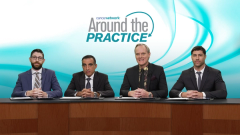
Maintenance Therapy Regimens for Patients With Transplant-Eligible MM
An expert panel discusses maintenance therapy for patients with MM and offers insights on how induction therapy impacts treatment options.
Episodes in this series

Transcript:
Ola Landgren, MD, PhD: What about maintenance therapy, Dennis? The category 1 therapy in the NCCN [National Comprehensive Cancer Network] Guidelines is still listed by 1 drug, lenalidomide. All the others are category 2A or 2B. There are trials investigating combinations. Individuals have also used proteasome inhibitors, like bortezomib or even carfilzomib. Could you shed some light on using 1 drug or 2 drugs and durations?
Dennis Verducci, APRN: Revlimid single agent has been the gold standard for maintenance for [multiple] myeloma for many years. But with the addition of immunotherapy now with daratumumab, we’re seeing how well patients respond, if you look at the MAIA study. The remission is very deep and durable. You can use daratumumab in the maintenance setting as well in combination with lenalidomide. What we tend to do in our clinic is give 8 cycles of daratumumab with carfilzomib, lenalidomide, and dexamethasone. Because daratumumab switches to monthly dosing after cycle 7, a very reasonable approach for maintenance therapy would be to continue that monthly daratumumab in addition to the lenalidomide standard of care.
Ola Landgren, MD, PhD: Is there any known cutoff? What’s the optimal duration? Is it 1 or 2 years? You mentioned the MAIA trial, which has continuous use of daratumumab. This is with lenalidomide, and there’s a 4-drug combination. For the maintenance setting, do we know how long you should do 2 drugs for?
Dennis Verducci, APRN: We don’t. The data are still nonspecific, and we have more work to do in that area. We take this in our clinic on a patient-by-patient case. If the patient tolerates therapy well and there are no adverse effects, and their IgG levels are within reason, you can continue for 1 or 2 years. Typically, we tend to stop after the 2-year mark and transition them to lenalidomide maintenance single agent. But we always want to restage them annually to check for MRD [minimal residual disease] status. If a patient is MRD positive after 1 or 2 years, it may be very reasonable to continue that patient on that triplet. If the patient is MRD negative after 1 or 2 years, you could consider transitioning to single-agent lenalidomide.
Ola Landgren, MD, PhD: Ben, for the choice of combination therapy up front, we’ve talked about different options. Would that impact what strategy you have for maintenance, or would you always go to the same maintenance strategy?
Benjamin Diamond, MD: That’s a bit of a complicated question. Thank you for asking it. Basically, we have 1 approved maintenance therapy, so we’re limited in what we can get approved. We can also de-escalate therapy and change the system a little that way to get our doublets. But in general, we’re using lenalidomide maintenance until progression. Most patients in the induction setting are getting that as part of their inductions, so the choice becomes pretty easy. For that reason, we don’t have to make the choice of adding an additional agent for maintenance therapy.
Ola Landgren, MD, PhD: Thank you, Ben. We probably all agree that if we have complicated cases, a good strategy is to discuss them with the team. Here in Miami, we’d bring it up at our tumor board. Commonly, we have doctors we collaborate with in private practice and other institutions reaching out to us who want to discuss complicated cases. When they’re all complicated cases, it’s always good to discuss and look at all the options.
Transcript edited for clarity.
Newsletter
Stay up to date on recent advances in the multidisciplinary approach to cancer.






































